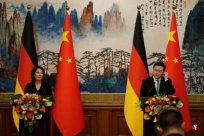The Taiwan Strait Exchange Foundation has discussed the debate between cross -strait relations in Guwang for 30 years. Taiwan scholars have called on mainland China to accept the historical facts and political reality of the existence of the existence of the "Republic of China", otherwise the cross -strait deadlock will not be resolved.
The Taiwan Sea Foundation will release a press release on the official website on Friday (April 14). When Professor Wu Anjia, deputy director of the International Research Center of Taiwan Politburo, made the above statements when he served as an instructions at the above seminar.
Wu An's family, also the deputy chairman of the mainland committee of Taiwan, said that defending the "Republic of China" is the bottom line of Taiwan, and it should also be the consensus of the party and the opposition.If mainland China does not accept the historical facts and political reality of the existence of the "Republic of China", the ride on both sides of the strait will not be resolved.
Gu Wang's talks was held in Singapore on April 27, 1993. The talks have also successfully signed the 30th anniversary of the expiration of the four agreements.Professor Wu Anjia, deputy chairman of the committee, and the consultants of the Sea Foundation discussed Gu Wang for 30 years. The meeting was chaired by Li Dawei, the chairman of the Sea Foundation, and Qiu Cuizheng, deputy chairman and secretary general, attended.
Wu An's family said that Gu Wang's talks have been 30 years old. The positioning of cross -strait relations must be clear, not blurred, and defending the consensus of cross -party factions.The basic principles of cross -strait interaction are communication, exchanges, establishing mutual trust, and avoiding war. The cross -strait should continue to maintain direct flights and small three -way communication. Only when there are exchanges to establish mutual trust.Opportunity to establish consensus.
Wu An's family analyzed the cross -strait policies of Lee Teng -hui, Chen Shui -bian, Ma Ying -jeou, and Tsai Ing -wen in the presidency during the introduction, as well as their differences in the development of cross -strait relations.
He said that during the administration of Taiwan's late President Lee Teng -hui, the "three non -policy" of the late president Jiang Jingguo (not contacting, not negotiating, not compromising), in the "set of disputes, seeking common groundwork",Under the guidance of the concepts and policies such as "easy and difficult, after the post -administration, step by step", "based on Taiwan, the mainland of mind, and the world", in 1993, it contributed to Gu Wang's talks and opened a new era that has never been in the new era of cross -strait exchanges in 1949.Essence
He also said that Chen Shui -bian proposed the EU model, the new intermediate route, etc. as the final solution of the cross -strait.He has repeatedly emphasized that the existence of the "Republic of China" is political reality and historical facts, and is equivalent to the People's Republic of China.Mainland China emphasizes "listening to its words and observing its deeds", "as long as you return to a Chinese principle, you can talk about everything," this reaction allows the stagnation of cross -strait relations to stagnateaffected.
Wu An's family said that when Ma Ying -jeou was in power, he acknowledged the "1992 Consensus", was recognized by mainland China, and resumed negotiations on both sides of the strait. He signed a total of 23 agreements during Ma Ying -jeou's administration.In addition, after Cai Yingwen's administration, she emphasized the respect of the "Republic of China" and regulations on cross -strait people's relations, emphasized the dignity of peer, and asked the mainland to restore negotiations.
For the 30 years of talks about Gu Wang, cross -strait has signed a number of agreements and frequently exchanges. Why cross -strait relations are still stagnant and they are still talking about basic issues.The Wu An family admits that cross -strait relations are very loaded. In addition to involving democratization and international factors, it also affects the "national" survival and development of the "Republic of China" and 23 million people's well -being.



